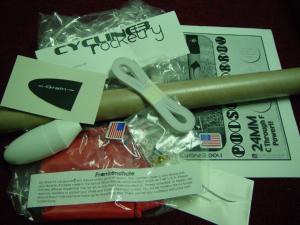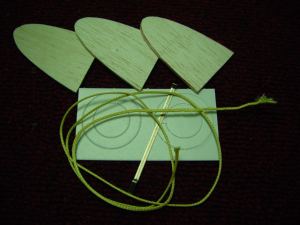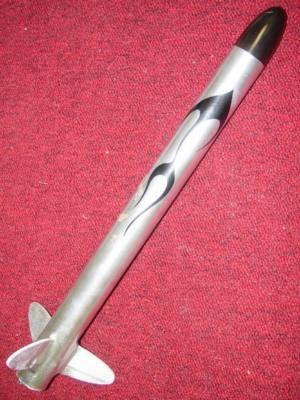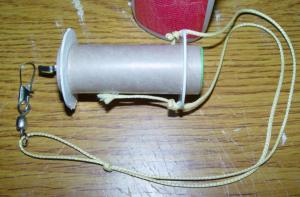| Manufacturer: | Cycline3 |

(Contributed - by Greg Deeter - 12/10/02)
 Brief:
Brief:
This is a single stage 20" tall rocket with 3 fins by CYCLINE3 which is
described as an "Ultra High Performance Mid-Power Rocket". The kit
comes with a unique and well made rectangular light fabric chute. This is the
second CYCLINE3 kit I have built, the first being the simply named #002b.
Construction:
This comes in an Estes type retail package, a plastic bag with peg ready header
card. Includes a 1.6" BT60, rounded plastic nose cone, 24mm engine tube,
rail buttons, fabric chute, 12 foot elastic shock cord, brass snap-swivel, very
nice quality black flame sticker, (6) page 8.5 x 11 manual and a CD-Rom of
flight videos which include this rocket.
The instructions with this kit are very good, and are some of the best I have ever seen. They explain why each of the methods of construction are suggested. One thing out of the ordinary in the instructions is that it calls specifically for Polyurethane glue for construction, which I was unable to locate. I used other methods for the construction which I will describe below.
The shape of the fins, I only happen to know by personal experience, are the same as were on the Estes Astron Sprint (OOP) from the late 70's. This is a nice choice for fin shape, yet considering that these must be cut and shaped from balsa fin stock that is not die-cut, this is not a kit for a beginner. The Balsa is good quality, and with a lot of patience, using a razor saw, several sizes of exacto knife blades and a sanding block, I was able to come up with nice looking fins. For someone who has never made fins this shape, this could be a challenge. For the more experienced builder, it's not hard really, with time and care.
 This kit calls for a
very unique method of creating an engine tube centering ring with Polyurethane
glue. Like the other Cycline3 kit I built, it does not come with a thrust ring
or engine clip. With this rocket, I decided to add a 24mm thrust ring and D
length engine clip, as well as two cardboard centering rings, all pulled from a
Mean Machine kit. I also added a 30" piece of Kevlar®
100# test cord.
This kit calls for a
very unique method of creating an engine tube centering ring with Polyurethane
glue. Like the other Cycline3 kit I built, it does not come with a thrust ring
or engine clip. With this rocket, I decided to add a 24mm thrust ring and D
length engine clip, as well as two cardboard centering rings, all pulled from a
Mean Machine kit. I also added a 30" piece of Kevlar®
100# test cord.
This kit, just as the other Cycline3 kit I built (#002b), is designed to be (4) ounces. Even with my modifications of engine tube rings, recovery and addition of a thrust ring and clip, both my Cycline3 #002b, and this Cycline3 #004 Poison Arrow, only came to 3.5 ounces each.
When mounting the fins, I went a little out of the way, in ways not suggested by the instructions. First I sanded off the glassine layer from the body tube all the way around the fin area. I then traced where the fins would be located, and using a very sharp exacto pin (like a map pin), I made (7) small holes in the body tube where each fin would mount. Then using a medium CA, I made a nice bead on each fin root, placed them and lined them up with an Estes fin alignment guide and clips. After the CA dried, I used DAP Woodweld yellow wood glue for fillets. It is my thinking that the tiny holes in the airframe will allow the CA to seep in, making little "rivets" sort of. This is a technique I gleaned from EMRR recently, when reading other reviews.
I added my own launch lugs instead of the rail buttons which were provided.
 Finishing:
Finishing:
The Cycline3 kits suggest using primer, then sanding and then using flat paint
for the color, followed by decals, then a gloss coat. The reason being as they
state, that flat paint does not tend to run like gloss paint. That's very true,
and nice attention to detail.
I skipped primer on this one, to fly it the same day. I'm not one to worry about a glass like finish. I painted this one as per the prototype shown on the cover of the manual, and in the flight video CD it came with. Nose cone gloss black, and the rest metalic silver.
The black flame decal that comes with this kit is one of the best quality I have ever seen with any rocket kit.
Due to the construction and finishing methods, I believe this kit should have a high skill level stated on it. The cutting and shaping of the fins requires previous experience. I'm going to have to take off 1/2 a point due to this. Here I give a (4.5/5.0).
Construction Rating: 4 out of 5
Flight:
This kit does not state any specific recommended motors, it just states
"24MM C Through F Power". Thank goodness for the new Estes C11's. I
popped a C11-5 in for the test flight before paint. A C11 put it so high that I
did not expect to recover it. This is most certainly a "High
Performance" rocket and a large field is recommended. I'm going to try it
on a D12, but only at a club launch where I can get some help tracking it.
This rocket if built right, should do just what mine did, and leap off the pad straight as an arrow. The flight was flawless. Not a bit of twist, spin or weather-cocking. Just straight as an arrow.
Recovery:
This rocket kit comes with a very nice quality, somewhat unusual, rectangular
shaped light cloth chute called a "Frankenchute". It's sort of a
peach color, very light and very strong. It is pre-assembled and has heavy
stitching and thick but light shroud lines. If purchased alone, the chute is
easily worth at least of what they charge for the entire kit. Don't forget the
wadding to protect the chute.
This kit comes with a 12 foot (not 12 inch) super long elastic shock cord, and an Estes type paper triple fold mount. Instructions suggest putting a staple through it and using epoxy to mount it to the inside of the body tube. I don't personally care for that method, so I modified mine, as described below. However, that method has been proven to work, and with the 12 foot shock cord and nice strong fabric chute, it sure deserves a 5/5 here.
Flight Rating: 5 out of 5
Summary:
This is a complete rocket kit with excellent materials and instructions. It's
design is innovative and it is most certainly high performance as it claims to
be. It comes with an excellent comprehensive instruction manual as well as a
high quality recovery system.
 I modified the recovery system a bit, just
out of personal preference. Taking a 30" long strand of 100# test Kevlar®
cord, I tied double knots in both ends. Then using an exacto knife I made small
V slits in two outside edges of the top motor tube centering ring. Using CA to
bond the knots, I then secured both ends of the cord to the mount ring. Making
certain that the loop would be an inch shy of being able to come out of the top
of the body, I added a snap swivel to be able to change chutes quickly, and
tied a knot about an inch from the top to create a second loop. While it is
unlikely that the Kevlar®
will burn through, if one side breaks, the other side should still hold. I then
attached the 12 foot elastic shock cord. Using this method, the shock cord will
be the only thing coming into contact with the body tube, and I do believe this
will prevent a tube zipper, even in the case of a late and quick decent
ejection. This is my personal double cord system.
I modified the recovery system a bit, just
out of personal preference. Taking a 30" long strand of 100# test Kevlar®
cord, I tied double knots in both ends. Then using an exacto knife I made small
V slits in two outside edges of the top motor tube centering ring. Using CA to
bond the knots, I then secured both ends of the cord to the mount ring. Making
certain that the loop would be an inch shy of being able to come out of the top
of the body, I added a snap swivel to be able to change chutes quickly, and
tied a knot about an inch from the top to create a second loop. While it is
unlikely that the Kevlar®
will burn through, if one side breaks, the other side should still hold. I then
attached the 12 foot elastic shock cord. Using this method, the shock cord will
be the only thing coming into contact with the body tube, and I do believe this
will prevent a tube zipper, even in the case of a late and quick decent
ejection. This is my personal double cord system.
Overall Rating: 4 out of 5
Sponsored Ads
 |
 |











